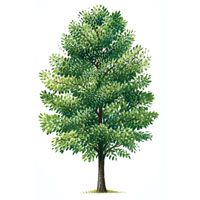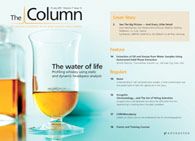Budding potential
Poplar buds could hold untapped potential as an ingredient in anti-ageing skin creams, a study has found.

Poplar buds could hold untapped potential as an ingredient in anti-ageing skin creams, a study has found. Poplar trees and other members of the Populus species are thought to possess great potential for therapeutic applications, and Propolis, a substance made from poplar buds by bees, has a long history as an antioxidant. Antioxidants are important in skin ageing as they can be used to support the body’s defences against reactive oxygen species and the inflammatory effects they cause. A study published in the Journal of Agricultural and Food Chemistry has profiled bud extracts to identify the compounds that cause this effect and their effect on skin ageing.1
The phenolic profile of poplar bud extract was analysed by reversed-phase analytical HPLC, and the main compounds were identified by MS and NMR. The main phenolic compounds were then analysed by assays to determine their individual antioxidant properties. Caffeic and p-coumaric acids were identified as the major antioxidant contributors, which, between them, were found to represent half of the total antioxidant activity of the extract.
A customized DNA microarray specifically designed to investigate skin ageing markers allowed the researchers to test the effect of the extract. According to the study, the results “indicate a potential beneficial effect of poplar bud extract on skin ageing as it showed a strong modulation of transcription of genes involved in antioxidant defences, inflammatory response and cell renewal.” The collective properties were suggested to possess antiageing properties, which could be used in cosmetic and nutraceutical formulations.
1. S. Dudonné et al., J. Agric. Food Chem., 59, 4527–4536 (2011).
This story originally appeared in The Column. Click here to view that issue.
New Method Explored for the Detection of CECs in Crops Irrigated with Contaminated Water
April 30th 2025This new study presents a validated QuEChERS–LC-MS/MS method for detecting eight persistent, mobile, and toxic substances in escarole, tomatoes, and tomato leaves irrigated with contaminated water.
University of Tasmania Researchers Explore Haloacetic Acid Determiniation in Water with capLC–MS
April 29th 2025Haloacetic acid detection has become important when analyzing drinking and swimming pool water. University of Tasmania researchers have begun applying capillary liquid chromatography as a means of detecting these substances.

.png&w=3840&q=75)

.png&w=3840&q=75)



.png&w=3840&q=75)



.png&w=3840&q=75)












